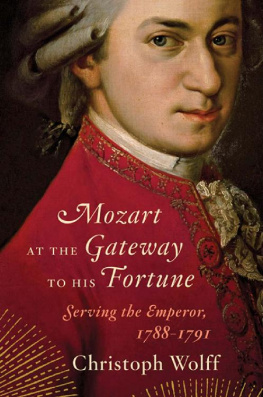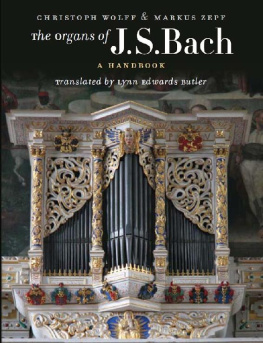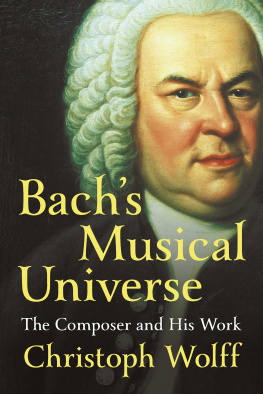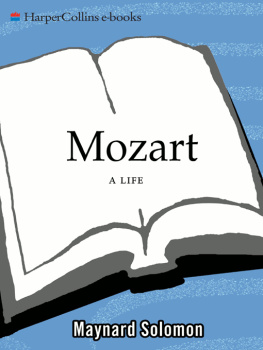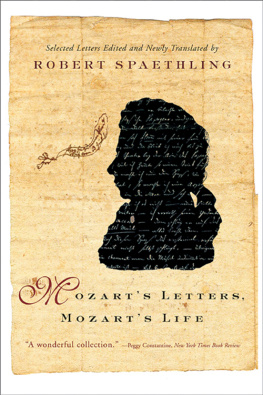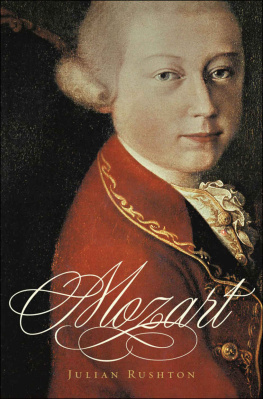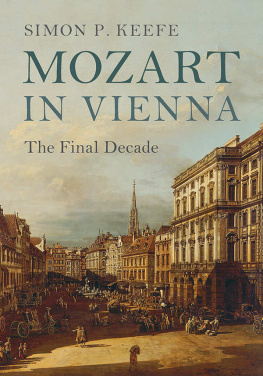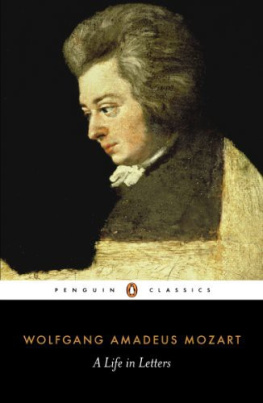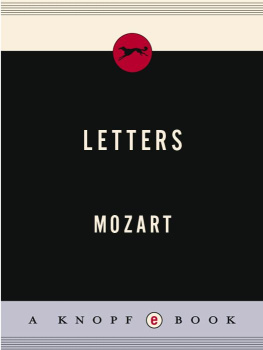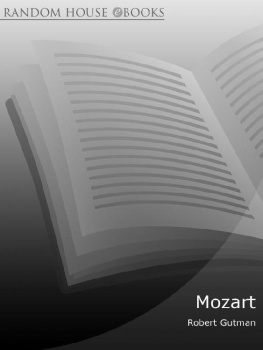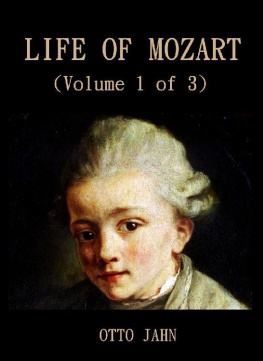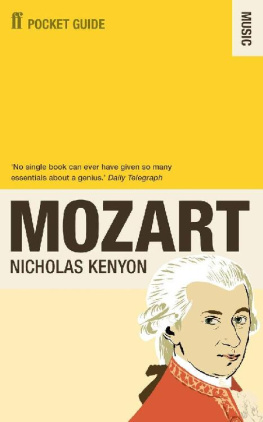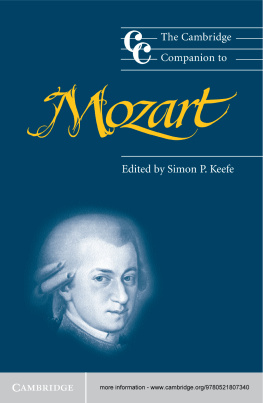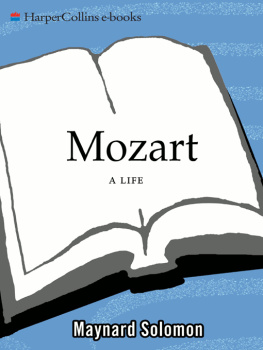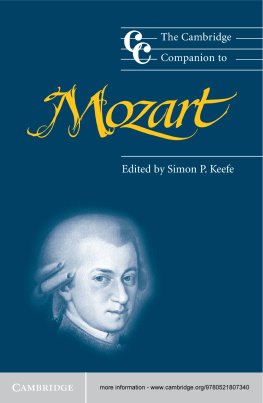A LSO BY C HRISTOPH W OLFF
The Organs of Johann Sebastian Bach: A Handbook (co-author, with Markus Zepf)
Johann Sebastian Bach: Messe in h-Moll
Zu gross, zu unerreichbar: Bach-Rezeption im Zeitalter Mendelssohns und Schumanns (co-ed.)
Musik, Kunst und Wissenschaft im Zeitalter J. S. Bachs (co-ed.)
Music of My Future: The Schoenberg Quartets and Trio (co-ed.)
Johann Sebastian Bach: The Learned Musician
ber Leben, Kunst und Kunstwerke: Aspekte musikalischer BiographieJohann S ebastian Bach im Zentrum (ed.)
Die Gegenwart der musikalischen Vergangenheit: Meisterwerke in der Dirigenten-Werkstatt (ed.)
Driven into Paradise: The Musical Migration from Nazi Germany to the United States (co-ed.)
The New Bach Reader: A Life of Johann Sebastian Bach in Letters and Documents (co-ed.)
The World of the Bach Cantatas (ed.)
Johann Sebastian Bach und der sddeutsche Raum: Aspekte der Wirkungsgeschichte Bachs (co-ed.)
Mozarts Requiem: Historical and Analytical Studies, Documents, Score
Bach: Essays on His Life and Music
A Life for New Music: Selected Papers of Paul Fromm (co-ed.)
Johann Sebastian Bachs Sptwerk und dessen Umfeld: Perspektiven und Probleme (ed.)
Bach, and Handel: The Consummation of the Baroque in Music, by Archibald T. Davison (ed.)
Bach Compendium: Analytisch-bibliographisches Repertorium der Werke Johann Sebastian Bachs (co-author, with Hans-Joachim Schulze)
Bach-Bibliographie: Nachdruck der Verzeichnisse des Schrifttums ber Johann Sebastian Bach (ed.)
Orgel, Orgelmusik und Orgelspiel: Festschrift Michael Schneider zum 75. Geburtstag (ed.)
The New Grove Bach Family
The String Quartets of Haydn, Mozart, and Beethoven: Studies of the Autograph Manuscripts (ed.)
Bach-Studien: Gesammelte Reden und Aufstze, by Friedrich Smend (ed.)
Der stile antico in der Musik Johann Sebastian Bachs: Studien zu Bachs Sptwerk

for
Wolfgang Rehm and David W. Packard
in friendship
Contents
Website: http://books.wwnorton.com/books/mozart-at-the-gateway-to-his-fortune/
Illustrations
Christoph Willibald Gluck at the keyboard, painting by Joseph-Siffrde Duplessis, 177475
Emperor Joseph II at the keyboard, with his sisters, painting by Joseph Hauzinger, 1778
Mozart entry in the court directory, K.K. Hof- und Staats-Schematismus, for 1789
Antonio Salieri, engraving by Johann Gottfried Scheffner, c. 1790
Prince Carl von Lichnowsky, miniature by an unknown artist
Playbill of Mozarts Leipzig Gewandhaus concert of May 12, 1789
Wolfgang Amad Mozart, silverpoint drawing by Doris Stock, Dresden, 1789
Mozarts ear vs. common ear, anonymous watercolor
Baron Gottfried van Swieten, engraving by Johann Georg Mansfeld, 1790
Gigue in G major, K. 574, Leipzig 1789 (Vienna: Artaria, 1792)
Piano Sonata in F major, K. 533, title page (Vienna: Hoffmeister, 1788)
Fugue for Two Pianos in C minor, K. 426, title page (Vienna: Hoffmeister, 1788)
Die Zauberflte , frontispiece of the original libretto (Vienna, 1791)
St. Stephens Cathedral, Vienna, engraving by Karl Schtz, 1792
Requiem, K. 626, beginning of Lacrimosa, autograph score
Mozarts thematic catalog, folios 28v29r, last entries, autograph, 1791
Mozarts thematic catalog, title label, autograph, 1784
Divertimento in F major, K. Anh. 108, autograph score
Kyrie in D major, K. Anh. 14, autograph score
Rondo of a clarinet quintet in A major, K. Anh. 88, autograph score
String quartet in G minor, K. Anh. 74, autograph score, rejected draft
String trio in G major, K. Anh. 66, autograph score83
String quartet in E minor, K. Anh. 84, autograph score
String quintet in A minor, K. Anh. 79, autograph score90
Mozarts thematic catalog, folios 29v30r
Preface
L IKE MANY who have performed, taught, researched, and written about Mozart, I have been drawn from the start to the exploratory and forward-looking drive so characteristic of his music. This feature is apparent everywhere throughout the composers career, but such final works as the last symphonies, The Magic Flute, or the Requiem tend to pose a challenge to the methodological and aesthetic premises long established in Mozart scholarship. In the prevailing view, the endless artistic reservoir of innovative approaches unfolding in Mozarts music is accompanied by a conjectured sense of closure in his art toward the end of his lifea perspective on Mozarts output for which I see neither external evidence nor internal logic. Hence, I realized the need for reassessing the composers final years from a viewpoint that disregards the usual emphasis on his looming death. Moreover, Mozarts appointment of December 1787 to the imperial court in Vienna, a factor more often underestimated than not, also calls for a reevaluation of its biographical and musical implications. And although some aspects of the discussion in this book have been exploredif perhaps less boldlyin some of my essays listed in the bibliography, all these studies have their own focus and pursue different and independent functions.
In this book, quotations from the letters of the Mozart family are mostly based on the translations by Robert Spaethling (2000) and, if omitted there, by Emily Anderson (1966). Some direct translations from the standard German edition (Bauer-Deutsch) as well as a few silent minor adjustments and modifications in Spaethling and Anderson are my own.
The musical examples in this book have been kept to a minimum. Fortunately, however, the complete works by Mozart are now easily and readily available online and free of charge in the monumental critical edition of the Neue Mozart-Ausgabe (NMA): http://dme.mozarteum.at/DME/nma. All references to Mozarts works in this book are made to the NMA.
My discussion in chapter 6 of several chamber music works left unfinished by the composer is supported by a dedicated website hosted by Harvard University, which contains color reproductions of Mozarts autograph manuscripts (ex. 6.69). The Harvard website can be found by visiting http://books.wwnorton.com/books/mozart-at-the-gateway-to-his-fortune/. Complementing these visual aids are recordings of these fragments by the Chiara String Quartet, made possible by a grant from the Harvard Department of Music, where the group currently serves as quartet-in-residence under the Blodgett endowment. I am most grateful to the members of the Chiara Quartet for having undertaken this special project and also to my academic department of thirty-five years for having supported it. Readers are encouraged to make use of the recordings on the website in order to be able to hear what is not offered in concert performances or on commercial CDs.
I would like to acknowledge gratefully the assistance of John Z. McKay (Cambridge, MA) in preparing the musical examples as well as the willingness of the following institutions for providing digital scans of the art works or book and manuscript pages in their collections: Stiftung Mozarteum, Salzburg; sterreichische Nationalbibliothek, Vienna; Kunsthistorisches Museum, Vienna; Harvard Universitys Houghton Library, Cambridge, MA; Biblioteca Donizetti, Bergamo; Beethoven-Haus, Bonn; British Library, London; Fitzwilliam Museum, Cambridge; Schsische Landes- und Universittsbibliothek, Dresden; and Stadtgeschichtliches Museum, Leipzig.
My deep thankfulness goes to my good friends and colleagues Ulrich Leisinger (Salzburg) and Robert Levin (Cambridge, MA) for reading and commenting on the entire draft manuscript; also to Dorothea Link (Atlanta, GA) for clarifying a number of issues relating to the first chapter. Their comments clearly helped to make this a better book. I also thank my wife, Barbara, for her sensitive and sharp eye that invariably improves my thinking and writing. Michael Ochs (New York, NY) once again earned my own and my readers special gratitude for thoughtfully and painstakingly wielding his editorial pen. I greatly appreciate Fred Wiemers thorough copyediting and, finally, I want to express my thanks to Maribeth Payne of W. W. Norton and her assistant, Ariella Foss, for their interest, patience, and unfailing support.
Next page
